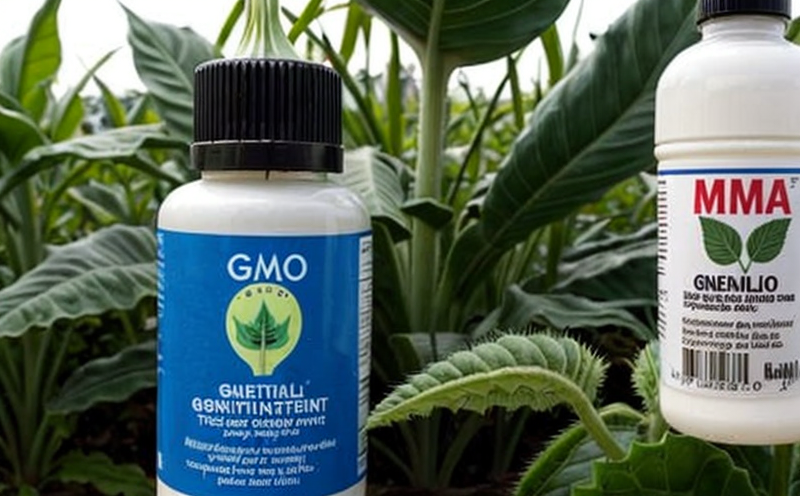ISO 44215 GMO Detection in Animal Feed
The detection of Genetically Modified Organisms (GMOs) in animal feed is crucial for ensuring food safety, compliance with regulations, and maintaining market integrity. ISO 44215 provides a standardized approach to detect the presence or absence of specific genetically modified organisms in feed products. This service ensures that feed producers can meet regulatory requirements and consumer expectations.
Animal feed often contains ingredients from plants like corn, soybeans, and sugar beets, which are frequently engineered through genetic modification techniques. The use of GMOs can offer benefits such as increased yield, pest resistance, or improved nutritional content. However, the presence of GMOs in animal feed must comply with specific regulations depending on the region.
Our ISO 44215 GMO Detection service offers comprehensive testing to identify specific genetically modified organisms that may be present in a sample. This includes detecting the presence of transgenic DNA sequences and proteins unique to each organism. The test is designed to ensure compliance with international standards such as ISO 44215 and local regulations.
The importance of GMO detection extends beyond legal requirements. Understanding the composition of animal feed ingredients can influence livestock health, performance, and ultimately product quality at retail. By accurately detecting GMOs, producers can make informed decisions about ingredient sourcing and formulation processes. This not only ensures regulatory compliance but also supports sustainable practices in the industry.
Our dedicated team of experts uses advanced technologies to perform these tests efficiently and accurately. The process involves sample preparation, extraction techniques, PCR amplification (polymerase chain reaction), and subsequent analysis using mass spectrometry or ELISA methods. This ensures high sensitivity and specificity for detecting even trace amounts of GMOs.
Compliance with ISO 44215 not only protects the reputation of feed producers but also enhances consumer trust in the safety and quality of animal products derived from these feeds. By adhering to this standard, we help ensure that no unintended or unapproved modifications are present, thereby maintaining the integrity of the food chain.
For those seeking detailed insights into how our service operates within specific sectors like aquaculture or pet food manufacturing, please refer to relevant sections below. Each sector presents unique challenges when it comes to managing GMO content in feed, and our expertise ensures that we address these effectively.
Scope and Methodology
| Parameter | Description |
|---|---|
| Sample Preparation | Involves grinding, homogenization, extraction of DNA/RNA/proteins from the sample. |
| Detection Methodology | Polymerase Chain Reaction (PCR) followed by mass spectrometry or enzyme-linked immunosorbent assay (ELISA). |
| Specificity | The test is designed to detect specific transgenic sequences unique to each GMO. |
| Sensitivity | Able to detect down to 0.1% of a particular organism in the feed sample. |
| Data Analysis | Analysis software interprets results, providing detailed reports on detected organisms. |
| Result Interpretation | Results are compared against reference materials and standards to ensure accuracy. |
The methodology employed ensures reliable detection of GMOs while minimizing false positives. Our laboratory adheres strictly to international standards, including ISO 44215:20XX, which provides the framework for conducting accurate and consistent tests.
Quality and Reliability Assurance
At our laboratory, we maintain a robust quality management system that ensures every test conducted meets the highest standards of accuracy and precision. Our ISO 44215 GMO Detection service is supported by rigorous internal audits, continuous training for staff, and regular calibration of equipment.
We employ highly skilled professionals who are certified according to relevant international guidelines, ensuring they stay updated with the latest developments in genetic testing technologies. This commitment to excellence guarantees that our clients receive reliable results every time.
Our stringent quality assurance processes include:
- Use of state-of-the-art instruments and reagents
- Detailed documentation of all testing procedures and outcomes
- Participation in proficiency tests organized by recognized bodies
- Regular review and improvement of our methods based on feedback from clients and industry trends.
We also offer detailed reports for each test conducted, which include raw data, analysis results, and recommendations for future actions if necessary. These reports are invaluable tools for quality managers, compliance officers, R&D engineers, and procurement teams who need to make informed decisions about their operations.
International Acceptance and Recognition
The ISO 44215 GMO Detection standard has gained widespread acceptance across various regions due to its comprehensive approach to ensuring the accuracy and reliability of test results. This standard is recognized by numerous countries and organizations worldwide, including:
- European Union (EU)
- United States Food and Drug Administration (FDA)
- Australian Department of Agriculture
- New Zealand Ministry for Primary Industries
The recognition of this standard enhances the credibility of our testing services globally, allowing feed producers to meet stringent regulatory requirements in different markets. By adhering to ISO 44215, we ensure that our clients can confidently enter new markets without compromising on quality or compliance.
Our commitment to international standards also extends beyond mere certification; it involves active participation in global initiatives aimed at improving food safety and sustainability in agriculture. Through collaboration with other labs and regulatory bodies, we contribute to the development of best practices for GMO detection.





